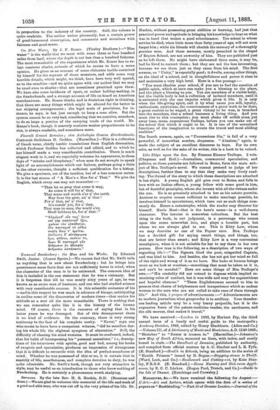Like Ships upon the Sea. By Frances Eleanor Trollope. 2
vole. (Chapman and Hall.)—Journalism, commercial speculation, and politics, as these pursuits are followed in Rome, form the main sub- ject of Mrs. Trollope's novel. We cannot pretend to judge of her descriptions, further than to say that they make very lively read- ing. The thread of the story to which these descriptions are attached is but slight. A young English girl goes over to Rome, and falls in love with an Italian officer, a young fellow with some good in him, but of doubtful principles, whom she invests with all the virtues under the sun. He is as genuinely attached to her as his nature permits. Anxious to acquire means sufficient to make marriage possible, he involves himself in speculations, which turn out as such things com- monly do. Hence a catastrophe, which the reader may discover for himself. Mario Masi—that is the hero's name—is a well-drawn character. The heroine is somewhat colourless. But the best thing in the bodk, in our judgment, is a personage who comes upon the scene somewhat late, and plays a humble part, but whom we are always glad to see. This is Kitty Low, whom we may describe as one of the Poyser race. Mrs. Trollops has a decided gift for saying smart things, and things, too, that are better than smart ; and Kitty Low is a very convenient mouthpiece, when it is not suitable for her to say them in her own person. How true is the following, as a description of two ways of regarding life !—" The Signora liked the poor, misguided Captain, and was kind to him. And besides, she has not got her mind so full of the right and wrong of it as we have. She looks at human beings more as we look at weather,—something that must be taken as it is, and can't be mended." Here are some things of Mrs. Trollope's own :—" His credulity did not extend to dogmas which implied re- straining rifles of conduct, but it was wide and easy for superstitious and hopeful chances." "These Englishwomen seemed to him to possess that charm of helplessness and inexperience which so endear women to the men who are not called to take care of them through life." And this, d propos of advertisements :—" Advertisements are to modern journalism what gunpowder is to artillery. Your thunder- ous leading article may be a very heavy projectile, but it is the expansive force of the patent-medicine vendor, the auctioneer, and the silk mercer, that makes it travel."


































 Previous page
Previous page